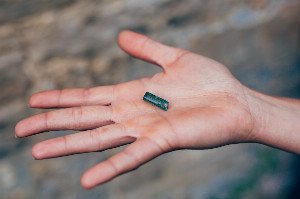Maylanny Christin, Ratih Hasanah, Husnita Husnita
Implementation of 7 Good Habits of Great Indonesian Children Through Writing for Goals Journaling Habits activity
Introduction
Implementation of 7 good habits of great indonesian children through writing for goals journaling habits activity. Implement 7 great Indonesian children's habits through journaling for goals! This study explores how junior high students build character, self-awareness, and achieve goals.
Abstract
The Great Indonesian Children's Habits Movement is a real manifestation of the Ministry of Education and Culture's commitment to developing a national education system that is oriented towards strengthening the nation's character. Through this movement, it will produce Indonesian children who are tough, superior and responsible both to themselves and to society, and will have an extraordinary impact on national change. This study aims to examine how community service activities are implemented, understand the perceptions and responses of junior high school students towards journaling activities as a medium for character building, and evaluate the effectiveness of journaling activities in implementing 7 good habits of great Indonesian children through writing for goals journaling habits activities. The habits that must be carried out by students every day are called the 7 habits of great Indonesian children, namely waking up early, praying, exercising, eating healthy and nutritious food, loving to learn, being in society, and going to bed early. This study uses a descriptive qualitative approach with the method used being the counseling and mentoring method in the form of workshop activities carried out in collaboration with SMP Sumatera 40 Bandung. The results of the study indicate that the implementation of 7 good habits of great Indonesian children in the lives of junior high school students greatly helps them to achieve their goals and build strong characters, which are an important part of the Great Indonesian Children movement. This activity not only increases self-awareness and goal-setting skills, but also strengthens children's characters through daily reflection. Journaling provides space for personal and meaningful learning. Therefore, the integration of positive habits in the world of education is an important step in realizing a competitive Indonesian golden generation that contributes to society. One effective way to instill positive habits is through writing for goals or journaling. Journaling can play a role in developing good habits and achieving goals gradually.
Review
This paper addresses a highly timely and pertinent topic concerning the character development of Indonesian youth, directly aligning with the Ministry of Education and Culture's "Great Indonesian Children's Habits Movement." The explicit goal of fostering tough, superior, and responsible citizens through structured habit formation is commendable and holds significant national importance. The study's clear objectives to examine implementation, understand student perceptions, and evaluate the effectiveness of journaling provide a robust framework for its community service-oriented approach. The focus on integrating the "7 good habits" through writing for goals journaling presents an innovative and practical strategy for character building within an educational context. Methodologically, the descriptive qualitative approach, utilizing counseling, mentoring, and workshop activities in collaboration with SMP Sumatera 40 Bandung, appears well-suited to explore the nuances of habit implementation and student engagement. The abstract effectively highlights the key findings, indicating that the journaling activities significantly aid students in achieving personal goals and developing strong character, thus contributing to the broader "Great Indonesian Children" initiative. The reported outcomes, including increased self-awareness, enhanced goal-setting skills, and character strengthening through daily reflection, underscore the potential of journaling as a potent tool for personal and meaningful learning. While the abstract clearly articulates the positive impact and the role of journaling, a more detailed exposition in the full paper on *how* "greatly helps" is observed and *what specific* perceptions and responses were gathered would greatly strengthen the claims of effectiveness. For instance, elaborating on the qualitative data analysis, providing illustrative examples of student reflections, or outlining the specific metrics used to evaluate character building would enhance the study's scientific rigor. Future iterations of this work could also explore the long-term sustainability of these habits and the potential for broader replication across diverse educational settings, further solidifying its contribution to national character education.
Full Text
You need to be logged in to view the full text and Download file of this article - Implementation of 7 Good Habits of Great Indonesian Children Through Writing for Goals Journaling Habits activity from Jurnal Abdimas .
Login to View Full Text And DownloadComments
You need to be logged in to post a comment.
Top Blogs by Rating
The Data Diet: What Big Data *...
By Sciaria
Beyond Back Pain: Is Your Ergo...
By Sciaria
The Invisible Architects: Are...
By Sciaria
Favorite Blog
Beyond Repair Shops: Unlocking...
By Sciaria
Genetic Dark Matter: The Unsee...
By Sciaria
The Uncomfortable Truth: Why G...
By Sciaria
Related Research
Pengembangan instrumen tes untuk mengukur kemampuan konsep dasar mata kuliah statistik
Memposisikan jenayah makanan dalam wacana fiqh al-‘uqūbah: kajian awal
Exploring the quality of eco-prints from floral waste across fabric variations
Share
Notice Board
- THE NORTHERN COAST OF THE BLACK SEA AS A “FRONTIER” AND ITS ROLE IN SHAPING THE SOCIETY IN UKRAINIAN HISTORY IN THE 16-18TH CENTURY
- GEOMORPHOLOGICAL AND GEOARCHAEOLOGICAL ELEMENTS AS GEOINDICATORS FOR THE EVALUATION OF RECENT VERTICAL MOTIONS ALONG THE CAMPANIA COASTLAND
- A CONVERSATION WITH ANDALEEB BADIEE BANTA, CURATOR OF MAKING HER MARK: A HISTORY OF WOMEN ARTISTS IN EUROPE, 1400-1800





